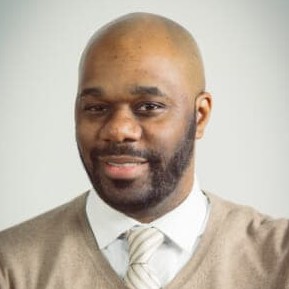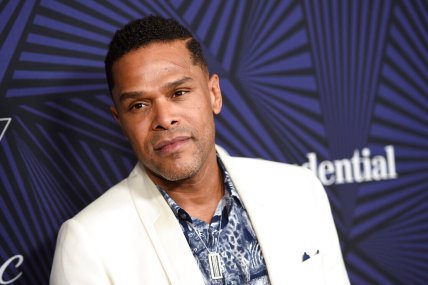The life aquatic, 25 years of Maxwell’s ‘Embrya’
Opinion: In recognition of the 25th anniversary of "Embrya," theGrio examines the album's impact on Maxwell's contemporaries and future artists, despite backlash it got when released.
Editor’s note: The following article is an op-ed and the views expressed are the author’s own. Read more opinions on theGrio.
In 1996, Maxwell’s “Urban Hang Suite” was a vital record for the so-called neo-soul movement. D’Angelo had cracked the door open in 1995 with “Brown Sugar;” Maxwell’s first album swung the door wide open so that Erykah Badu could walk through with “Baduizm” in 1997.
Electronics retailer Best Buy once described the album on a primitive version of its website as a combination of Marvin Gaye’s “Let’s Get It On” and Stevie Wonder’s “Journey Through the Secret Life of Plants.” This comparison seems appropriate as a pure, surface-level assessment, but it doesn’t give due respect to the intentionality of the album’s creation.
Following the double platinum success of “Urban Hang Suite,” fans and critics were all too willing to anoint Maxwell as the next suave R&B lover man. Songs like “Til the Cops Come Knockin’,” “Ascension (Don’t Ever Wonder),” and his “MTV Unplugged” rendition of Kate Bush’s “This Woman’s Work” put him in a position to take the baton of men like Marvin Gaye and Al Green.

Critics of “Embrya” undoubtedly had expected either a facsimile or a more digestible continuation of “Urban Hang Suite” for its follow-up. Maxwell’s debut was a brilliant album that was easy for people to rally around. It followed a linear narrative and harkened to a style of music that they were used to but with a contemporary execution and swagger.
However, on June 30, 1998, they got something they were surprised to find. The title “Embrya” implies creation, beginnings, and development with an obvious nod to womanhood and femininity. Also, it plays on the thematic fluidity prevalent throughout the album. That’s understandably a lot to take in for fans and critics who thought that Maxwell was a throwback to a groove and sound that was already proven.
Stuart Matthewman, co-founder and composer of the band Sade, co-produced “Embrya,” employing Sade’s longtime engineer Mike Pela. Sonically, “Embrya” took cues from Sade’s 1992 album, “Love Deluxe,” an amalgamation of their signature sound with a harsher rhythmic attack, and an expansion of atmospheric orchestration, heard particularly on “No Ordinary Love” and “Cherish the Day.”
In fact, the accompanying music video for “No Ordinary Love,” featuring lead vocalist Sade Adu as a mermaid under the sea, also foreshadowed the direction of Maxwell’s next album.
Maxwell lets the listener know from the start that there is indeed an aquatic nature to “Embrya.”
The front and back cover find Maxwell underwater; both the hidden first track, “Gestation: Mythos,” and the closing title track are indicators of the embryonic, subaqueous motif taking place that plays on the mystery of water and/or womb. This is even addressed in the video for the album’s lead single, “Luxury: Cococure,” which finds Maxwell in a bathtub.
Many critics needed help to embrace Maxwell’s progression into a new abstract paradigm. The late, great Greg Tate wrote in Spin magazine that “Embrya” came off as “New-Agey, art-rock pretentious, emotionally calculated, and sappy,” but he also expressed disappointment that Maxwell didn’t “push the envelope more.”

Although the album was met with confusion and, in some cases, condemnation, some listeners still embraced it, evidenced by its platinum certification. Even with its ambitious new sounds, elements from “Urban Hang Suite” like organic brass and slapping bass licks, still carried over, as heard in songs like “Matrimony: Maybe You” and “Arroz con Pollo.” With further hindsight and examination, “Embrya” was a blueprint for the brooding, hazy, and methodical R&B music we hear today from famous and progressive acts alike.
Maxwell confounded consumers right from the start with his songs’ naming conventions. He injected colons in the song titles, implying a double meaning to each track and a visual implication of a deeper meaning each song may or may not possess.
Writer-director Dream Hampton wrote that the song titles were “ridiculous” and “loaded” in her Village Voice review. She opined that the songwriting was “lazy” and that Maxwell hadn’t earned a pass for being eccentric the way Prince earned one by being a musical genius.
Maxwell used his method of titling songs to continue to express sexuality with the same quantity and intention that he did on “Urban Hang Suite.” The opening line of “Ever Wanting: To Want You to Want” begins with “Lay on right here on top if you want to/I’m giving all I got, every drop, don’t you want to.” However, he addressed sensuality in a far more esoteric, poetic way for much of the album.
In “Luxury: Cococure,” Maxwell speaks about the polarity of love and commitment. “It’s a happy in a sad/it’s a more that’s less/it’s a glad.” This type of coded lyricism gets more mysterious in “Know These Things: Shouldn’t You,” “Submerge: Til We Become the Sun,” “Drowndeep: Hula,” and there’s the aquatic motif again.
Sonic exploration and enigmatic lyricism converged best on “Gravity: Pushing to Pull.” Containing a drum beat that was equally as industrial as it was tribal, Maxwell describes his quest for sexual satisfaction as a hunt: “As the moments drip like water/I’ll be patient for my slaughter.” With sparse but aggressive electric guitar strikes going in and out during the chorus over pulsating strings and Fender Rhodes, the track is a standout accomplishment not just on “Embrya” but in Maxwell’s entire catalog.

“Embrya” is part of the pantheon of misunderstood, underrated Black albums whose quality and intrigue have increased with time. Much like Wonder’s “Journey Through the Secret Life of Plants,” Gaye’s “Here, My Dear,” or Aretha Franklin’s “Hey Now Hey (The Other Side of the Sky),” Maxwell’s “Embrya” is a singular addition to the alternative soul canon that is integral to the Black musical evolution at the turn of the century.
Maxwell’s courageous move on his sophomore album foreshadowed the drastic progression his contemporaries would make on their respective sophomore albums just two years later. D’Angelo went from the hazy jazz and blues inflections of “Brown Sugar” to “Voodoo,” an inebriated fusion of Detriot hip-hop and Southern soul sensibilities. Badu abandons the sparse blend of hip-hop and ’80s R&B of “Baduizm” to create “Mama’s Gun,” a dynamic album that incorporates elements of rock, hip-hop, funk, folk and lounge singer vibes.
Indeed, “Embrya” helped smooth the road for his so-called neo-soul brothers and sisters in its immediate aftermath. In addition, Maxwell’s subaquatic journey in search of sensuality and discovery paved the way for today’s artists to be more adventurous. They adopted the sonic tapestry of “Embrya” and its bold approach to creation and execution.
Much of Jesse Boykins III’s catalog owes a debt to “Embrya,” notably his soulfully languid debut, “The Beauty Created.” We might not have gotten Moses Sumney’s intrepid, infectious music if Maxwell hadn’t cleared the path with “Embrya.” SZA’s records benefit from the ethereal attacks and moody orchestrations on “Embrya.” The album’s influence even crossed into hip-hop, via Vince Staples’ adopting its underwater avant-garde motif for his “Big Fish Theory” album.
If “Urban Hang Suite” was a relaxing, naughty session in a hot tub, then “Embrya” is what happens when you leave the warm confines of the hot tub and jump into a cold swimming pool. It’s stark and uncomfortable at first, but if you allow yourself time, your body will match the temperature, and you’ll enjoy the swim even longer.

Matthew Allen is an entertainment writer of music and culture for theGrio. He is an award-winning music journalist, TV producer and director based in Brooklyn, NY. He’s interviewed the likes of Quincy Jones, Jill Scott, Smokey Robinson and more for publications such as Ebony, Jet, The Root, Village Voice, Wax Poetics, Revive Music, Okayplayer, and Soulhead. His video work can be seen on PBS/All Arts, Brooklyn Free Speech TV and BRIC TV.
TheGrio is FREE on your TV via Apple TV, Amazon Fire, Roku, and Android TV. Please download theGrio mobile apps today!



